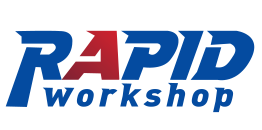Rapid Tooling For Injection Molding
What is rapid tooling? Rapid tooling is a specialty service for making certain kinds of plastic injection mold tools and finished parts in a fraction of the time it takes to make full-production volume tools. It relies on optimizing the design, fabrication, and materials to achieve maximum production efficiency and minimal downtime.
How Does Rapid Tooling Work?
Rapid Workshop offers a unique rapid tooling system. A single master machinist is responsible for your tool from start to finish. Using modular mold bases and P20 tool steel, a machinist can produce a finished mold in as little as ten days from the approval of design drawings. These molds use standard plastic resins and fillers to make fully functional finished parts in relatively limited quantities. There are many advantages to rapid tooling. Finished parts can be used for prototypes, product testing and certification, and as bridge production towards higher volumes. Rapid tooling injection molding also helps our clients to limit their financial exposure to new designs.
What Are The Limitations Of Rapid Production Tooling?In order to achieve rapid results, there are some necessary limitations to the kinds of tools and Rapid Workshop that can be made using this approach. These limitations don’t mean you get an inferior tool. Rather, we simplify the development process in order to achieve the shortest possible production lead time at the least expense. Simplicity * Rapid tools are two-piece molds, with at most two cavities per mold. This means there are no extra sliders or hand-loaded inserts. * The geometries must be relatively simple, not requiring sophisticated gate/runner systems or complex cooling channels. * Simple geometries allow for basic ejector pin strategies. * Simple geometries don’t require expensive MoldFlow analysis. Surface Texture * Rapid tools have as-machined surfaces, with minimal polishing or bead blasting. Modular Inserts * Only the inserts are machined. They’re designed to fit into standard mold bases for ease of manufacturing and to reduce material usage. Cold Runners * Cooling circuits use standard cold runners, not hot runners. Standard Tolerances * Tools are machined to DIN-27681-fine standards. There may be other minor limitations depending on the project. We review every design in advance to ensure it meets our criteria for rapid production tooling. |
Rapid Tooling Mold Material: Aluminum or Steel?
Rapid Tooling Mold Material: Aluminum or Steel?
Rapid Workshop uses only P20 steel for rapid production tooling. We do this because P20 steel is as easy and fast to the machine as aluminum, using standard cutting tools and requiring no post-machining heat treatment. Such tools are called ‘semi-hardened’. It produces an excellent surface finish, and the raw material isn’t as prone to supply disruptions. P20 steel is also equal in price to aluminum per tool. But most importantly, it’s much more durable, making a better tool that can produce more finished parts. We believe there are no practical advantages to using aluminum over steel.
Rapid Tooling FAQ
What makes Rapid Workshop’s rapid tooling service unique?
What makes Rapid Workshop’s rapid tooling service unique?
Does Rapid Workshop provide industrial design support or product development support as part of their rapid tooling system?
We perform a complete design for manufacturing analysis of every project that we accept. In this analysis, we may offer insights about design improvements that make it easier to manufacture, while reducing cost and production lead time. We also offer complete production tooling services for higher volumes.
What are Rapid Workshop’s quality standards for its rapid tooling system?
Our quality standards are the same as those for all of our services. We carefully inspect all incoming materials and issue a complete verification analysis at your request. You will receive a T1 first-article inspection report and sample to confirm all dimensions and tolerances for your rapid tools and finished parts.
How do I get a quote for Rapid Workshop’sproduction tooling?
We make it easy to get a fast quotation. Simply upload your CAD files and product details, and we’ll send you a free quotation within 24 hrs or less.
Our Material VerificationWe use X-ray fluorescence and spectrophotometry to measure the precise molecular composition of all the raw materials we use for your tooling. You can be assured you get exactly the material grade you specify. Our attention to detail doesn’t stop when your mold is completed. We’re not satisfied until your finished parts have been fully verified in our modern quality control metrology lab.
| Toolmaking Tolerances and Finishing GuidelinesUnless otherwise specified by you, our standard tolerances conform to DIN-2768-1-fine. Surface finishes for the core and cavity of mold tools can be made according to the classification system of the Plastics Industry Association using their general surface finishing guidelines. If you need the finest in rapid toolmaking services, contact Rapid Workshop today.
|
Request Your Rapid Tooling Quote Today
Request Your Rapid Tooling Quote Today
Our improved algorithm decreases rapid tooling quotation times by up to 90%. Most quotes are delivered within 24 hrs. and usually much less, depending on project details. Your customer support partner will contact you directly to ensure you’ve received and understand all aspects of your quotation and to answer any questions you may have.
The Plastic Injection Molding Process
Plastic injection molding is the process of filling a mold tool with liquid plastic resin under great pressure. The tool may comprise a single cavity or hundreds of cavities in order to make indefinite numbers of parts. Once the mold tools have been carefully designed and manufactured, the molding process consists of the following basic steps:
* Step 1 – The plastic resin comes in raw pellets. These are dried to the right moisture content, and then if necessary they can be blended with pigments or master batch colorants to create the correct color for the design.
* Step 2 – The dried pellets are poured into the hopper of the molding machine. A reciprocating screw inside the barrel of the machine is used to transport these pellets towards the mold while at the same time heating them.
* Step 3 – Within the barrel, the pellets are mixed and heated until fully molten, forming the liquid resin.
* Step 4 – The heated mold closes automatically and resin, under great pressure, is injected through a gate and into the mold cavity.
* Step 5 – The mold is cooled in a short amount of time to solidify the part inside.
* Step 6 – The mold opens and the part is ejected to begin a new cycle.
Want to learn more about plastic injection molding?
Want to learn more about plastic injection molding?
Advantages Of Injection Molding
Advantages Of Injection Molding
Injection molding services from Rapid Workshop offer you many advantages. It’s the most stable and reliable way to make unlimited volumes of end-use plastic parts to suit virtually any application in any industry. In addition, engineering resins can replace metal parts in many cases, which reduces weight and saves cost.
Frequently Asked Questions About Plastic Injection Molding
|
Request Your Free Injection Molding Quote Today
Request Your Free Injection Molding Quote Today
Our improved AI algorithm decreases quotation times by up to 90%. Most quotes are delivered within 24 hrs, or faster, depending on project details and your injection molding needs. Your customer support partner will contact you directly to ensure you’ve received and understand all aspects of your quotation and to answer any questions you may have about injection molding, the manufacturing process, the materials we use, your quote, and beyond!













